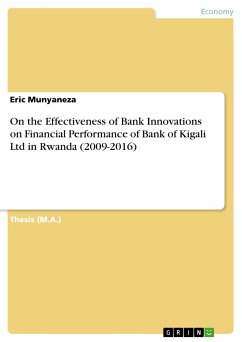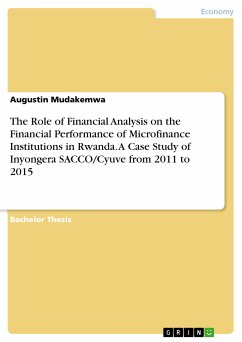Thesis (M.A.) from the year 2017 in the subject Business economics - Investment and Finance, grade: DISTINCTION, , course: MBA, language: English, abstract: This work analyzes the effectiveness of bank innovations on financial performance of Bank of Kigali Ltd in Rwanda (2009-2016). Banking innovation has played an important role in improving service delivery standards in the Banking institution. In its simplest form, Automated Teller Machines (ATMs), POS, credit cards, mobile banking and other deposit machines now allow consumers carry out banking transactions beyond banking hours. The main objective of the study was to establish the effectiveness of bank innovations on financial performance of Bank of Kigali Ltd in Rwanda. The population under study is 35 staffs of Bank of Kigali Ltd to be given questionnaires and interviewed. A descriptive survey research design was adapted where a total sample of 35 respondents was selected. The primary data were collected using structured questionnaires and interview to address the effect of banking innovation on financial performance of Bank of Kigali. Consequently, both qualitative and quantitative data were collected. The first hypothesis of the study was analyzed on effect of bank innovation on income of Bank of Kigali Ltd. The findings shows 35 staffs of Bank of Kigali Ltd have responded to the administered questionnaire, their mean on the ATM, POS, credits and debit cards, mobile banking internet banking, electronic fund transfer, and digital innovation are strong and their standard deviation are heterogeneity. The second hypothesis was verified where the bank innovations performance were indicated that customers, deposits, incomes increased year to years, loans to assets respect the standard of BNR which says that loans does not exceed 80% of customer deposit and ROE ratio is the following: 29%, 19%, 16%, 19%, 21%, 20%, 21% and 24% respectively. The third hypothesis of the study was to establish the comparison of bank innovations and performance of Bank of Kigali Ltd where before innovation where before innovation number of customers were 135,564 from 2009 while after establishing innovation become 262,284 in 2016. The branches, POS, Mobibank, and ATM have been increased after implementation of innovation in Bank of Kigali. The fourth hypothesis which determines the correlation between bank innovation and performance of Bank of Kigali revealed that there is a strong relationship between two variables which means banking innovation contributed to the performance of Bank of Kigali.
Dieser Download kann aus rechtlichen Gründen nur mit Rechnungsadresse in A, B, BG, CY, CZ, D, DK, EW, E, FIN, F, GR, HR, H, IRL, I, LT, L, LR, M, NL, PL, P, R, S, SLO, SK ausgeliefert werden.









